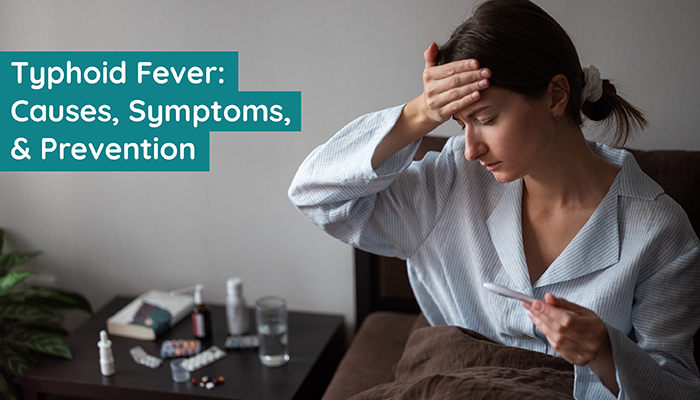Typhoid, also known as typhoid fever or enteric fever, is caused by the Salmonella Typhi bacterium (S. Typhi). It is associated with flu-like symptoms, high fever, and diarrhoea. You can spread typhoid even if you are not really showing symptoms but have it. Typhoid can be fatal and must be treated as early as possible with antibiotics. If you reside in or intend to visit a region where typhoid is prevalent, you should consider getting vaccinated.
What is typhoid fever & Its causes?
Typhoid fever is a bacterial illness caused by the bacterium Salmonella Typhi. These bacteria enter your body through contaminated water or food or even through contact with a typhoid-infected person and infects your gut (small intestine), resulting in symptoms such as stomach pain, high fever, headache, and diarrhoea or constipation. You will often hear parathyroid fever mentioned in conjunction with typhoid fever because paratyphoid fever has symptoms similar to typhoid but is less severe. Salmonella Paratyphi is the causative agent for paratyphoid fever. S. Paratyphi and S. Typhi are not similar to the bacterium Salmonella, which results in salmonellosis, a common cause of food poisoning, but are related to Salmonella.What’s the difference between typhoid and typhus?
The bacterium Salmonella Typhi causes Typhoid. Typhoid fever typically spreads through contaminated food and water. Typhoid recovery requires a course of antibiotics and lasts anywhere from a few days to several weeks. Recovery can take longer if the case is severe.Typhus, on the other hand, is transmitted through insect bites, such as lice and fleas. Several bacteria cause Typhus, such as Rickettsia or Orientia bacteria, commonly found in insects.
Symptoms of Typhoid and Typhus can overlap. Typhus presents as high fever, headaches, chills, tiredness, and muscle aches.
Who can be affected by typhoid fever?
Even today, in the remote areas of developing countries with no modern sanitation, typhoid fever is one of the most common illnesses. Typhoid is amongst the common illnesses in South and Central America, South and Southeast Asia, the Caribbean, and Africa. Moreover, tourists are most vulnerable to this disease when visiting India, Pakistan, or Bangladesh. Fever in typhoid begins slowly and rises every day, potentially reaching 104.9 °F (40.5 °C) (known as stepladder fashion). Children are considered the most vulnerable to typhoid fever around the world. This might be due to their developing immune systems; however, children with typhoid present milder clinical symptoms than adults.Causes of Typhoid Fever
Salmonella Typhi causes Typhoid fever; its related bacteria cause Salmonella food poisoning.Salmonella Typhi is typically found in human excretion. If an infected person does not wash their hands thoroughly after using the toilet, they can contaminate any food or water they touch. In areas where sanitation is handled poorly, Salmonella Typhi is often found in water sources contaminated by human waste.
Other Typhoid fever causes include:
- Using a contaminated toilet and touching your mouth before washing your hands.
- Having oral sexual activity with a person carrying the Typhoid-causing bacteria.
- Eating raw vegetables that were fertilized with human waste.
- Eating seafood from a contaminated water source.
Signs and symptoms of typhoid fever
Clinical signs and symptoms are likely to appear gradually, typically between 1 and 3 weeks after exposure to the typhoid disease. Early signs and symptoms of the illness include:- Fatigue and weakness
- Muscle pain
- Fever
- Headache
- Sweating
- Weight loss and appetite loss
- Dry cough
- Pain in the stomach
- Rashes known as ‘rose spots’, which usually appear on the trunk (stomach and chest).
- Constipation or diarrhoea
When should you see a doctor?
If you suspect you have typhoid fever, see a doctor right away. If you become ill while travelling in another country where typhoid is endemic, contact your country’s consulate to obtain a list of practitioners. If you continue to experience symptoms after returning home, consult a doctor who specialises in infectious diseases or international travel medicine. A doctor who is experienced in these fields will be able to evaluate and treat your symptoms quickly and effectively. Nowadays, it is possible to book your appointment online from the comfort of your home.What are the stages of typhoid fever?
Similar to many other illnesses, Typhoid fever progresses through several stages. There are three distinct stages of Typhoid fever, from exposure to recovery. They are as follows:Stage 1
Stage 1, also known as the incubation period, is the time between exposure and the appearance of the first symptoms. During this stage, the Salmonella Typhi bacteria multiply rapidly inside your body. The patient may not experience the symptoms right away. This stage can last from 3 to 60 days– the average is around 8 to 14 days.Stage 2
This stage is also known as the Acute Stage. The first symptoms of typhoid fever begin to appear during the Acute Stage. The most common symptoms are high fever that typically ranges from 102°F to 104°F, muscle aches, headaches, and fatigue. The Acute Stage can last for several weeks. If the typhoid treatment is avoided, it can lead to serious complications.Stage 3
Stage 3 is also called the Convalescence Stage. The patient's body begins to fight back at this stage. The patient feels better, and the fever subsides. This stage is gradual, lasting up to a few weeks after the Acute Stage. The patient may still experience symptoms like fatigue and weakness, and feel generally unwell. Your doctors may monitor you closely during this stage, as there is a chance of relapse.Remember, complications can occur at any point during the three stages. If Typhoid treatment is ignored, detrimental complications can occur, such as internal bleeding, perforation, or splitting of the digestive system, chronic fatigue, breathlessness, irregular heartbeat, vomiting blood, and more.
How does typhoid fever spread?
Most individuals get infected with typhoid fever by consuming contaminated water or food or even by coming into direct contact with an infected person. Once infected, they can transmit the illness to others via the faecal–oral route. You can become infected if you consume food that has been handled by a person with typhoid fever who has not washed their hands thoroughly after using the toilet. Carriers of typhoidEven after receiving antibiotics, a small percentage of people recovering from typhoid continue to harbour the typhoid bacteria. Such individuals are known as chronic carriers; they have no symptoms or signs of the disease, but they continue to release the typhoid bacteria in their faeces and can infect others.
How is typhoid fever diagnosed?
Typhoid fever will be diagnosed by your health practitioner based on your travel history, symptoms, and lab tests. It is crucial to inform your doctor if you have recently travelled to a region prone to the disease or suspect you have been exposed to someone with typhoid fever; otherwise, they may not prioritise testing for it. Salmonella Typhi is typically identified in a blood culture, stool culture, or another body fluid and tissue culture. Although a culture test is the most commonly used typhoid test, other tests, for instance a blood test performed to identify antibodies susceptible to typhoid bacteria or a blood test used to inspect for typhoid DNA, may also be used to verify a suspicious typhoid infection.What is the treatment for typhoid fever?
Antibiotics are used to treat typhoid. Since some new strains of the bacteria are resistant to certain antibiotic treatments, you will be given different antibiotics based on the kind of enteric fever you have and the region where you got sick. If you are critically ill or experience complications, you may require additional treatments. These treatments will almost certainly necessitate your hospitalisation. Typhoid complications If typhoid is not treated, it can lead to serious complications, such as:- Perforation of the intestine
- Internal bleeding
- Meningitis
- Brain-related conditions such as seizures, confusion, and delirium
- Inflammation of the bones (osteomyelitis)
- Inflammation of the heart
- Failure of the kidneys
- Pneumonia, bronchitis, and other respiratory problems
Prevention of typhoid
Typhoid fever can be prevented and controlled with improved sanitation, safe drinking water, and adequate medical care. Unfortunately, achieving these in many developing countries may be difficult. For example, safe drinking water and adequate medical care may not always be available in some parts of a developing region. As a result, many specialists consider vaccines to be an effective way of preventing typhoid fever. If you live in or plan to visit areas where typhoid fever is common, you should get vaccinated.Vaccines against typhoid fever
Typhoid fever vaccines are available in two forms of administration, oral and intravenous. However, these vaccines cannot provide protection against typhoid forever, and you will need to get booster shots to stay protected. They significantly lower your risk, but they do not guarantee that you will not get typhoid. Vaccines may provide some immunity against paratyphoid fever, but this is yet to be proven.- Oral vaccine: The typhoid oral vaccine consists of four pills taken every other day.
- Injectable vaccine (shot): The typhoid vaccine is administered in a single dose. It is recommended that you get it at least two weeks before your trip to allow your body time to build up defences (make antibodies) against the typhoid bacteria. Children over the age of 2 years can obtain this typhoid vaccine. To remain protected, you may need to take additional (booster) shots every 2 years.
- You should wash your hands frequently. Washing hands in soapy, hot water is the most effective way to prevent infection. It is advisable to wash hands prior to preparing food, consuming it, and after using the restroom. If you do not have access to water, keep an alcohol-based hand sanitiser handy.
- Drinking tap water should be avoided. Drinking water contamination is a particular issue in endemic typhoid regions. Thus, you should only consume canned or bottled water and carbonated beverages. Moreover, bottled water that has been carbonated is comparatively safer than non-carbonated water. It is recommended to request beverages without ice. Brushing teeth with bottled water and avoiding swallowing shower water.
- Raw vegetables and fruits should be avoided, particularly leafy vegetables or fruits that cannot be peeled, because they might have been cleaned in contaminated water. To be completely safe, you should avoid all raw foods while outside.
- Select foods that are hot. Avoid eating or storing food at room temperature. Foods that are steaming hot are the best. Even though there is no assurance that meals served in the top restaurants are reliable, it is best to stay away from street vendors' food because it has more chances of being contaminated.
If you are currently recovering from typhoid, the following precautions can help us keep others safe:
- Take your antibiotics as directed. Take your antibiotics according to your doctor's instructions and complete the entire prescribed medication.
- Wash your hands frequently. This is the most crucial thing that can help you prevent the infection from spreading to others. Scrub your hands thoroughly for at least 30 seconds with hot, soapy water, particularly prior to consuming food and after going to the toilet.
- Avoid touching food. Cooking for others should be avoided until your doctor suggests you're no longer infectious.


